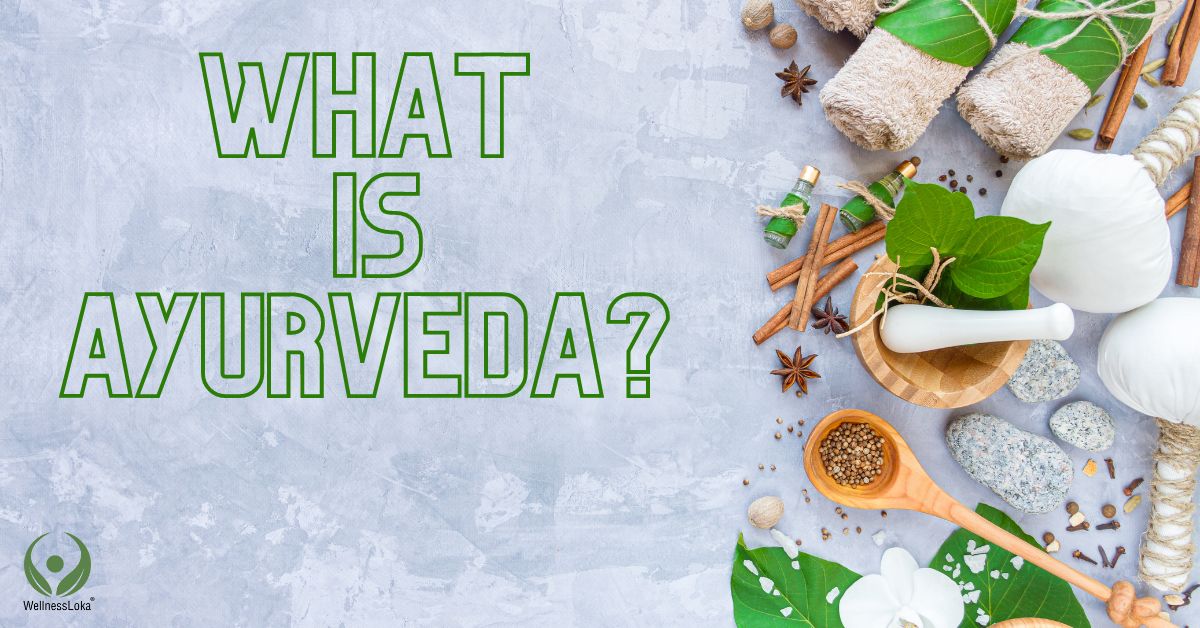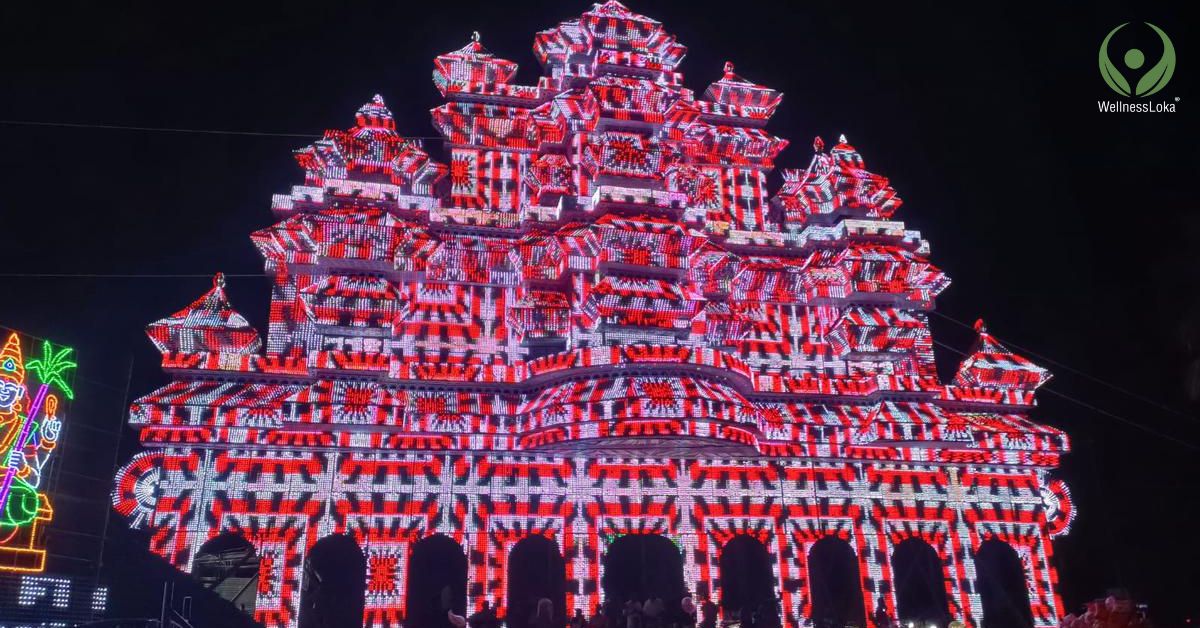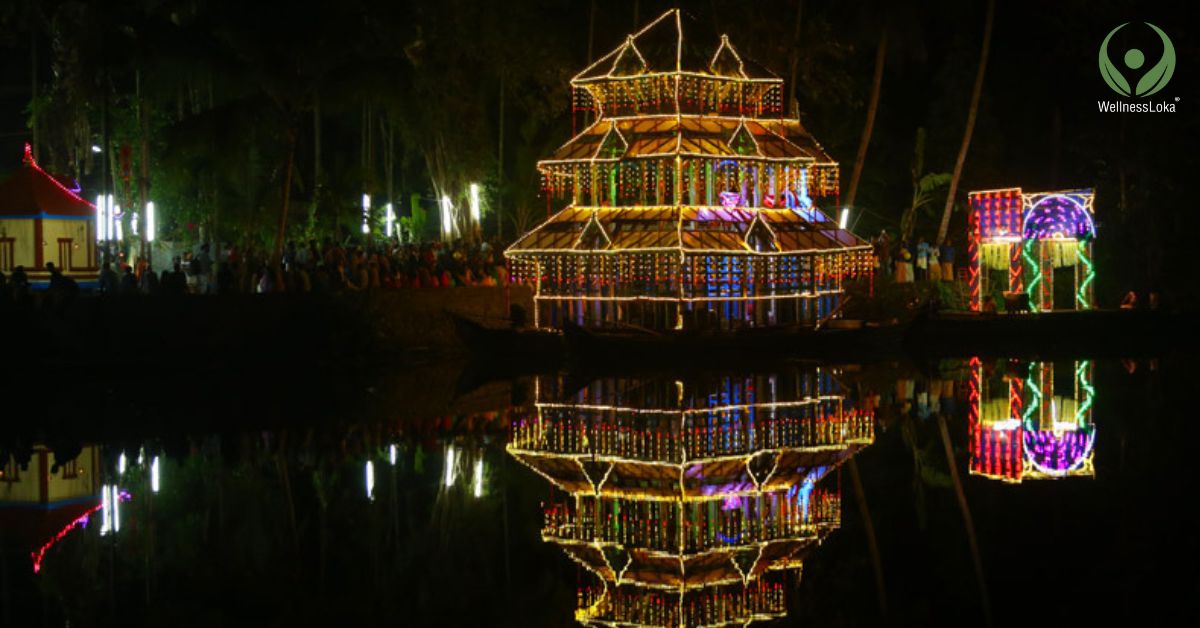WHAT IS AYURVEDA ?
The name “AYURVEDA” is derived from words in Sanskrit,“ayuh” meaning “life” or “longevity” and “veda”meaning “science “or “sacred knowledge “.Hence the meaning of Ayurveda is “THE SCIENCE OF LONGEVITY ” or “THE SACRED KNOWLEDGE OF LIFE “.
Ayurveda is as old as the life itself ,is one of the world’s oldest holistic healing system . Ayurveda is the science of life. It explains the nature of everything in the universe, and it is the art of living in harmony with nature. As per Ayurveda perfect health is defined as a state of balance between mind, body, spirit, and social well-being.
Rather than treating only the symptoms, Ayurveda focuses on finding and treating the root cause of the disease. Any type of disease (physical, mental, emotional, or spiritual) is caused by an imbalance. Being a holistic science, Ayurveda can help you balance and improve several aspects of your life, including digestion, sleep, food and nutrition, skin care, sexual health, massage, and mental health.
Ultimately, Ayurveda focuses on promoting a healthy and satisfying life experience free of negative emotions and aspects by supporting a natural balance.
WHAT IS MEANT BY ‘BALANCE’ IN AYURVEDA ?

The concept of ‘being in balance’ is an integral and core principle in Ayurveda which guides every other facet and even determines your relationship with this science. Perfect health, according to Ayurveda, is a balance between the body, mind, soul, and social well-being. Every thought and practice in this system, therefore, mirrors the dual principles of balance and connection.
Ayurveda is best characterized as the science of living in tune with nature’s laws. Ayurvedic philosophy of natural and holistic medicine encourages people to live a balanced existence by making healthy and natural lifestyle adjustments.
Principles of Ayurveda:
1. THE FIVE ELEMENTS
Ayurvedic principles and practices are based on the concept of 5 fundamental elements that are the building blocks of nature, they are-
Prithvi-earth, Jala – water, Agni- fire, Vayu- air, Akasha-space
- Earth (Prithvi):
- Qualities: Solidity, stability, heaviness, and density.
- Manifestations: Provides structure and support to the body, including bones, muscles, and tissues. It governs qualities like strength, stability, and groundedness.
- Water (Jala):
- Qualities: Fluidity, cohesion, and adaptability.
- Manifestations: Governs all bodily fluids, such as blood, lymph, saliva, and digestive juices. It’s associated with emotional and mental adaptability, flexibility, and receptivity.
- Fire (Agni):
- Qualities: Heat, transformation, and digestion.
- Manifestations: Drives metabolic processes in the body, including digestion, assimilation, and transformation of food into energy. It’s associated with the intellect, willpower, and the transformative aspects of consciousness.
- Air (Vayu):
- Qualities: Movement, lightness, and expansiveness.
- Manifestations: Governs all movement in the body, including breathing, circulation, nerve impulses, and muscular movements. It’s associated with qualities like creativity, enthusiasm, and adaptability to change.
- Space (Akasha):
- Qualities: Space, emptiness, and expansiveness.
- Manifestations: Provides the space for all other elements to exist and interact. It represents the subtlest aspect of matter and consciousness. It’s associated with qualities like spaciousness, openness, and connection to the divine.
In Ayurveda, imbalances in these elements or doshas are believed to lead to physical and mental ailments. Ayurvedic treatments aim to restore balance through practices such as diet, lifestyle modifications, herbal remedies, yoga, meditation, and various therapies. The goal is to align the individual with their innate constitution (prakriti) and maintain harmony with the surrounding environment.
2.The Three Doshas :
In Ayurveda, the doshas are the fundamental energies that govern all biological, psychological, and physiological functions in the body. They are derived from the five elements (ether, air, fire, water, and earth) and are responsible for maintaining balance and harmony within the body. Understanding the doshas is crucial in Ayurveda, as imbalances in these energies can lead to various physical and mental health issues.
1. Vata Dosha:
Characteristics:
- Vata is primarily composed of the elements of ether and air, making it light, dry, cold, rough, subtle, and mobile.
- It governs movement, including nerve impulses, circulation, respiration, elimination, and muscle contractions.
- Individuals with a predominant Vata constitution tend to be creative, enthusiastic, and energetic when balanced. However, they may also experience anxiety, fear, and restlessness when imbalanced.
2. Pitta Dosha :
Characteristics:
- Pitta is primarily composed of the elements of fire and water, making it hot, sharp, light, oily, liquid, and spreading.
- It governs digestion, metabolism, transformation, and regulation of body temperature.
- Individuals with a predominant Pitta constitution tend to be focused, ambitious, and intelligent when balanced. However, they may also exhibit traits of irritability, anger, and perfectionism when imbalanced.
3. Kapha Dosha:
Characteristics:
- Kapha is primarily composed of the elements of water and earth, making it heavy, slow, cool, oily, smooth, dense, and stable.
- It governs structure, stability, lubrication, and maintenance of the body’s tissues and organs.
- Individuals with a predominant Kapha constitution tend to be calm, compassionate, and grounded when balanced. However, they may also exhibit traits of lethargy, attachment, and stubbornness when imbalanced.
Finding Balance:
So, how do we keep these doshas in check and live in harmony with the rhythms of nature? Ayurveda offers a treasure trove of wisdom – from mindful eating and daily routines to herbal remedies and yoga practices tailored to your unique constitution.
- Vata: Nurture yourself with warm, nourishing foods and embrace stillness through meditation and gentle yoga flows.
- Pitta: Cool your fiery passions with cooling foods like cucumber and coconut water, and find release through vigorous exercise and cooling breathwork.
- Kapha: Stimulate your senses with invigorating spices and vibrant foods, and awaken your body with energizing activities like brisk walks and dynamic yoga sequences.
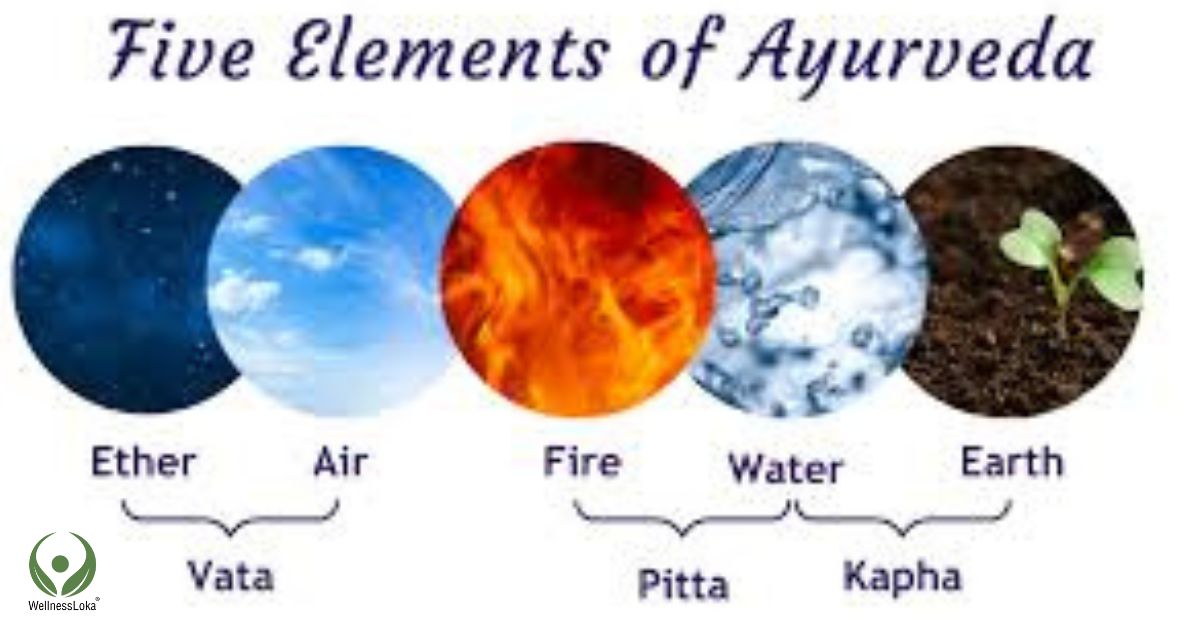
3.Prakriti (Constitution):
In Ayurveda, it is believed that each person is born with a specific Prakriti, determined by a unique combination of the three doshas: Vata, Pitta, and Kapha. These doshas are the bioenergetic forces that govern all physiological and psychological functions within the body. While everyone has all three doshas, the proportion and dominance of each vary from person to person, resulting in different Prakritis.
Types of Prakriti:
- Vata Prakriti: Characterized by qualities of air and space, individuals with a predominant Vata constitution tend to be creative, energetic, and prone to variability. They may experience imbalances such as anxiety, dry skin, and digestive issues when out of harmony.
- Pitta Prakriti: Governed by the elements of fire and water, those with a Pitta constitution are typically ambitious, organized, and driven. They are susceptible to imbalances like inflammation, acidity, and irritability when Pitta is aggravated.
- Kapha Prakriti: Rooted in the elements of earth and water, individuals with a Kapha constitution are often strong, stable, and nurturing. They may encounter issues such as sluggishness, weight gain, and respiratory congestion when Kapha becomes excessive.
Determining Your Prakriti: Ayurvedic practitioners assess Prakriti through a combination of physical examination, pulse diagnosis (Nadi Pariksha), and detailed questioning about lifestyle, habits, and health history. By understanding your unique Prakriti, you can tailor your diet, exercise routine, daily routine, and self-care practices to maintain balance and prevent disease
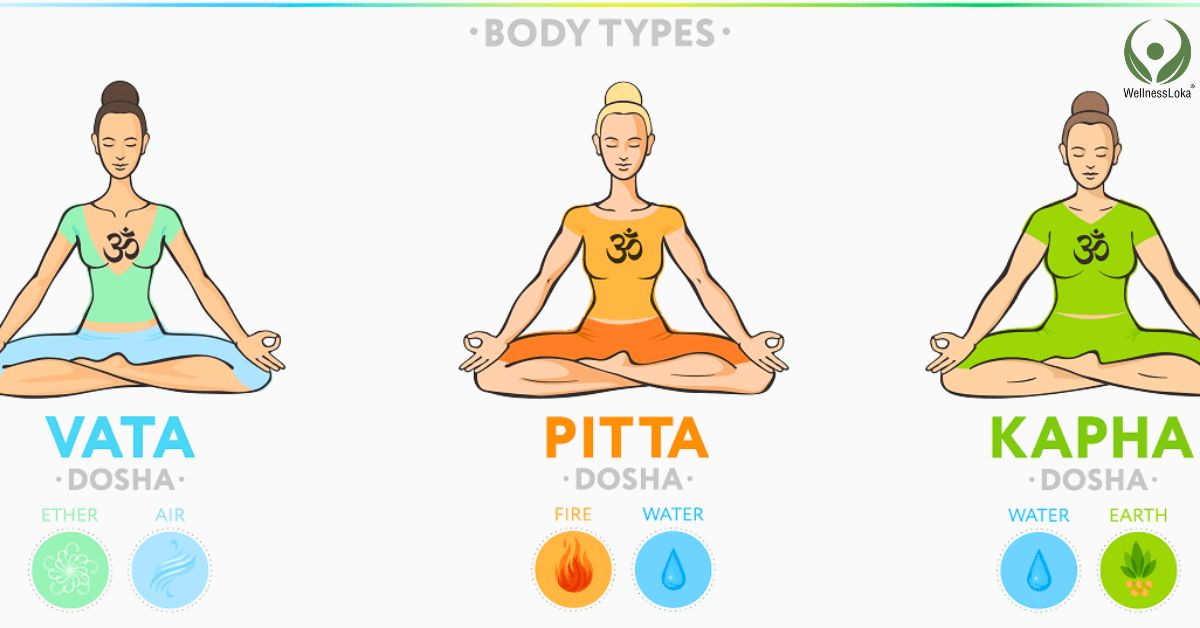
The Art of Wellness: A Journey Through Ayurvedic Practices and Therapies
In the fast-paced hustle of modern life, it’s easy to lose sight of our connection to ourselves and the world around us. But amidst the chaos, there exists an ancient beacon of wisdom – Ayurveda, the science of life. Rooted in the profound understanding that true health encompasses not just the body but also the mind and spirit, Ayurveda offers a holistic approach to well-being that nourishes every aspect of our being. Let’s embark on a journey through the transformative practices and healing therapies that lie at the heart of Ayurvedic wellness.
The Art of Eating:
1. Eating for Balance: Ayurveda teaches us to view food not just as fuel but as medicine. By aligning our diet with our unique doshic constitution, or Prakriti, we can support our body’s natural equilibrium. Whether it’s warming spices for Vata, cooling greens for Pitta, or stimulating herbs for Kapha, Ayurveda offers a cornucopia of culinary delights tailored to our individual needs.
2. Herbal Alchemy: Nature’s pharmacy holds an abundance of healing treasures, from golden turmeric to fragrant tulsi. Ayurvedic herbal remedies harness the potent therapeutic properties of these botanical allies to restore balance and vitality to the body. Whether it’s sipping on soothing ginger tea to calm digestion, applying cooling aloe vera gel to soothe inflamed skin, or taking a daily dose of ashwagandha to combat stress, the healing power of herbs is an integral part of Ayurvedic self-care.
Rejuvenating Rituals:
1. Panchakarma Detox: At the heart of Ayurvedic rejuvenation lies Panchakarma – a transformative detoxification and purification process that cleanses the body of accumulated toxins and restores harmony to the doshas. Through therapies like oil massage (Abhyanga), herbal steam baths (Swedana), and cleansing enemas (Basti), Panchakarma helps us shed the physical and emotional debris that weighs us down, leaving us feeling renewed and revitalized.
2. Therapeutic Touch: Ayurveda embraces the healing power of touch through a variety of therapeutic bodywork techniques. From the soothing strokes of Shirodhara to the invigorating herbal poultices of Pinda Sweda, these ancient therapies work to release tension, promote circulation, and enhance the body’s innate healing abilities. As warm oils penetrate the skin and aromatic herbs infuse the senses, we drift into a state of deep relaxation and rejuvenation.
Mind-Body Practices:
1. Yoga and Pranayama:
- Yoga, with its emphasis on movement, breath, and mindfulness, is a powerful tool for balancing the doshas and promoting overall well-being. Specific yoga poses and pranayama (breathwork) techniques can be tailored to pacify aggravated doshas and restore harmony to the body and mind.
2. Meditation and Mindfulness:
- Meditation practices, such as mindfulness meditation, loving-kindness meditation, and mantra meditation, cultivate inner peace, clarity, and resilience, helping to alleviate stress and promote emotional balance.
Lifestyle Recommendations:
1. Daily Routines (Dinacharya):
- Following a daily routine aligned with the rhythms of nature – from waking with the sunrise to eating regular meals and prioritizing restful sleep – supports optimal health and vitality according to Ayurvedic principles.
2. Seasonal Practices (Ritucharya):
- Adapting lifestyle practices, diet, and self-care rituals to the changing seasons helps maintain balance and resilience throughout the year, preventing seasonal imbalances and promoting overall well-being.
The Benefits of Ayurveda: A Clear Path to Wellness
In a world where the pace of life seems to accelerate with each passing day, finding balance and vitality can feel like an elusive dream. Yet amidst the chaos, there exists an ancient system of medicine that offers a beacon of hope – Ayurveda. Rooted in the wisdom of the sages and the rhythms of nature, Ayurveda is not just a system of healing; it’s a way of life that empowers us to reclaim our health and well-being in body, mind, and spirit. Let’s embark on a journey to explore the myriad benefits that Ayurveda has to offer.
1. Holistic Healing:
Ayurveda views health as a state of balance between body, mind, and spirit. Through therapies like Panchakarma detoxification, herbal remedies, dietary adjustments, yoga, and meditation, Ayurveda restores harmony to the entire being, facilitating holistic healing from the inside out.
2. Personalized Medicine:
Central to Ayurveda is the recognition that each individual is unique, with their own distinct constitution and health needs. By tailoring treatments to suit the specific needs of each person, Ayurvedic practitioners offer personalized recommendations that address imbalances and promote optimal health.
3. Prevention and Wellness:
Ayurveda places great emphasis on preventive measures to maintain health and well-being. Daily routines, seasonal practices, and rejuvenation therapies help bolster the body’s natural defenses, warding off illness and promoting longevity.
4. Natural and Sustainable:
Ayurvedic remedies harness the healing power of nature, utilizing herbs, spices, minerals, and oils in gentle yet effective treatments. From herbal teas to oil massages and dietary recommendations, Ayurveda offers sustainable solutions that work in harmony with the body’s innate intelligence.
5. Mind-Body Connection:
Ayurveda recognizes the intimate connection between the mind and body, offering practices that promote mental clarity, emotional stability, and spiritual growth. Through breathwork, meditation, and therapeutic treatments, Ayurveda helps cultivate a deeper awareness of the mind-body connection.
6. Enhanced Digestive Health:
Digestive health is paramount in Ayurveda, as it is believed to be the cornerstone of overall well-being. Herbal remedies, dietary guidelines, and detoxification practices support optimal digestion and nutrient absorption, promoting vitality and longevity.
7. Sustainable Weight Management:
Ayurveda takes a holistic approach to weight management, addressing underlying imbalances and promoting healthy metabolism through dietary adjustments, herbal supplements, and lifestyle modifications tailored to individual needs.
8. Emotional Balance and Mental Clarity:
Ayurvedic treatments for emotional well-being include herbal remedies, therapeutic practices, and meditation techniques that help soothe the mind, reduce stress, and enhance mental clarity, fostering emotional resilience and well-being.
9. Hormonal Harmony:
Ayurvedic remedies support hormonal balance through herbal supplements, dietary modifications, and lifestyle practices that promote reproductive health and hormonal stability throughout all stages of life.
10. Radiant Skin and Hair:
Ayurvedic skincare rituals and herbal formulations nourish the skin and hair from within, promoting a healthy glow and lustrous locks through natural, non-toxic methods.
11. Spiritual Growth and Connection:
Beyond physical health, Ayurveda offers a pathway to spiritual growth and connection through practices like self-reflection, gratitude, and service to others, fostering a deeper understanding of oneself and one’s place in the world.
Conclusion: Embracing Ayurveda for a Life of Balance and Harmony
In the fast-paced world we live in, where stress, toxins, and imbalances abound, the ancient wisdom of Ayurveda shines as a beacon of hope for those seeking true wellness. Through its holistic approach to health, Ayurveda offers a comprehensive framework that addresses the root causes of illness and promotes balance in body, mind, and spirit.
From personalized medicine tailored to individual constitutions to preventive measures that bolster the body’s natural defenses, Ayurveda provides a roadmap to vibrant health and vitality. By harnessing the healing power of nature through herbal remedies, dietary adjustments, and therapeutic practices, Ayurveda offers sustainable solutions that work in harmony with the body’s innate intelligence.
In essence, Ayurveda is not just a system of medicine; it is a way of life—a journey to total well-being that encompasses every aspect of our being. By embracing the timeless wisdom of Ayurveda and integrating its principles into our daily lives, we can unlock the secrets to vibrant health, vitality, and inner harmony, and embark on a path to a life lived in balance and abundance.
Are you ready to take the next step towards holistic wellness with Ayurveda?
Discover the art of holistic wellness at WellnessLoka
WellnessLoka is established with the aim of making the world a healthier and a happier place. With a carefully curated selection of 3500+ wellness retreats in collaboration with 250 trusted gurus and properties, we simplify the process of discovering and booking authentic Ayurveda and Yoga experiences. Our team of experienced wellness consultants and doctors are here to assist you choose the retreat that best aligns with your goals and budget. As your dedicated representative in Kerala, we prioritise your interests, ensuring peace of mind during your stay. We maintain long-term partnerships with resorts, allowing us to secure the best prices for you!
Visit www.wellnessloka.com to explore the world of authentic wellness retreats.

